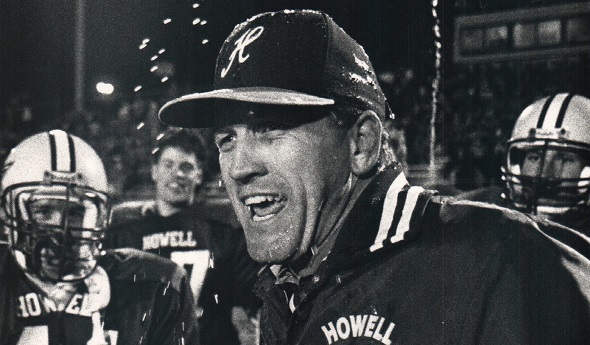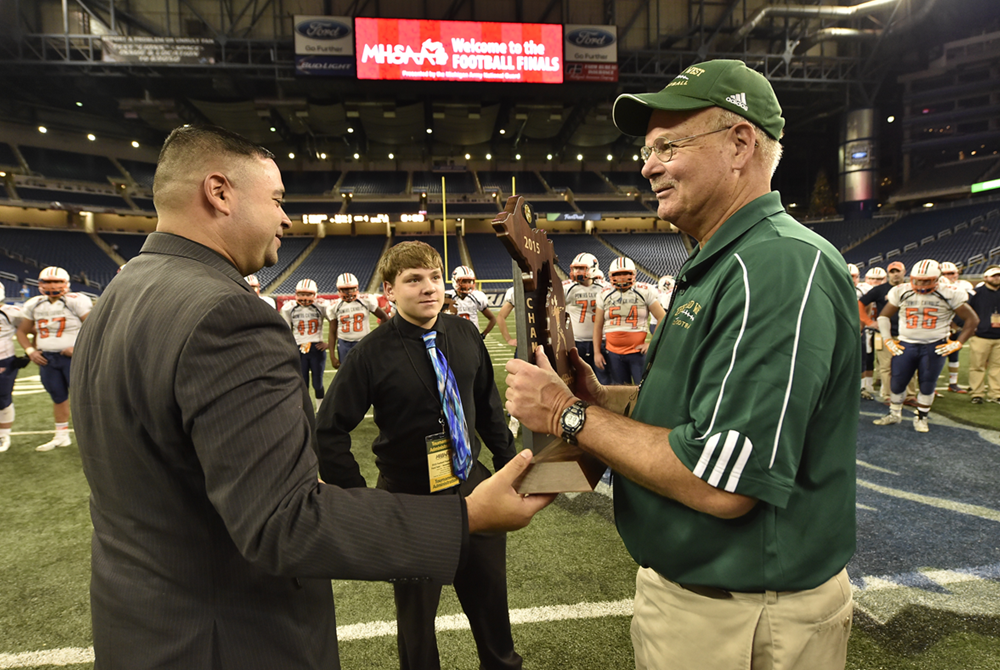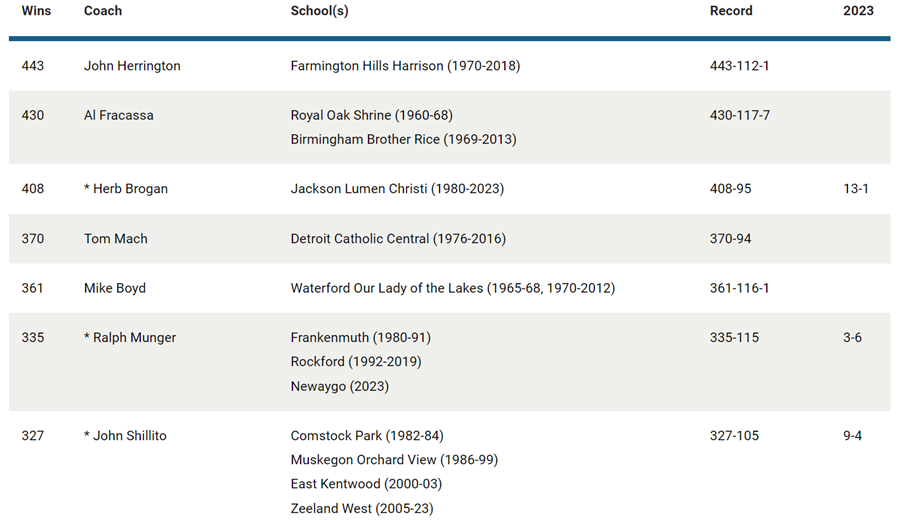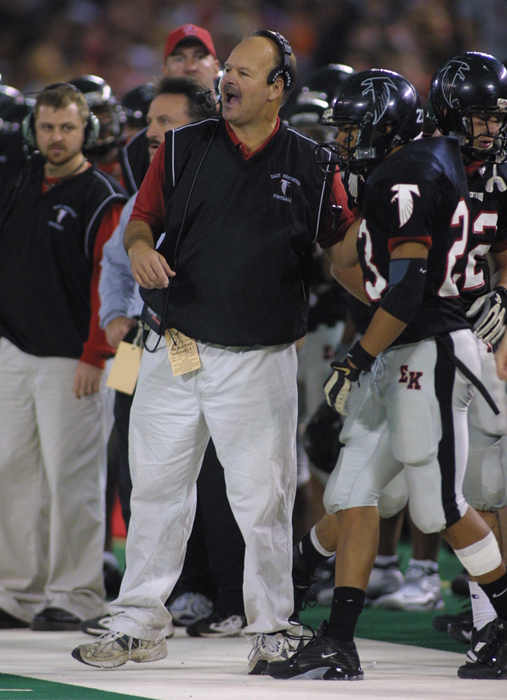
Howell Names Field for Longtime Leader
August 30, 2018
By Tim Robinson
Special for Second Half
If you got the impression that John Dukes has been around Howell football forever, you wouldn’t be far off.
 His association with the program began before high school.
His association with the program began before high school.
“When I was a kid, I used to live near Page Field (Howell’s former athletic complex), and I would go out and watch football practice,” Dukes said. “I was at practice all the time, and the coach said, ‘If you’re going to be here all the time, you may as well get some water for the boys while they’re practicing.’”
That was in 1963, when the Highlanders went 9-0.
A little more than 55 years later, Dukes will be honored tonight when the field at Howell’s Memorial Stadium will be named John Dukes Field.
Howell football coach Aaron Metz began the drive to name the field after Dukes when it was determined the old turf, installed in 2004, needed to be replaced.
“We have a commitment award named for John,” he said. “If you play football for four years, you get the John Dukes Commitment Award. We put a committee together with people who have been around Howell for a long time, and when you ask anybody, they say there’s not a person more deserving than John Dukes.
“So I ran it up the ladder to the athletic director and superintendent, and, to be honest, it was a pretty easy process because no one could find anything bad about John,” Metz added. “We’re excited to have the opportunity to do it.”
Dukes was a three-year varsity player at Howell and then played at Alma College, where his teams won three league championships.
With the exception of six years at Hartland coaching under his son, Marcus, John Dukes has been affiliated with Howell football for 46 years, including 25 as the head coach.
After graduating from Alma in 1972, Dukes got a teaching job at Howell and was an assistant freshman coach for a season and a varsity assistant for two before taking over as head coach at age 25.
“My philosophy at the time was I wanted to help the kids enjoy playing football and help them to be successful at it,” he recalled. “The previous three years our record wasn’t very good. That was one of my objectives, was to make it fun.”
He then talked about his first season with a little self-deprecation, a common thread in most conversations with Dukes.
“I remember my first game,” he said. “Because I played defense in college (Dukes was a linebacker), I thought we were going to be a really good defensive team. We played Fenton in my first game, and we lost 32-19, so my defensive prowess wasn’t good at the time.”
The Highlanders lost six of their first seven games that season, but won the last two and went 8-1 three seasons later.
In all, Howell had winning records in 15 of his 25 seasons, but one group of players stood out for an entirely different reason.
“We had a period of time (1989 and 1990) where we weren’t very good, and we lost 17 games in a row,” he said. “But those kids were wonderful kids to coach. They came to practice with energy all the time, and from a coaching standpoint, it was wonderful to coach them during the week. Now, Fridays were a different story, because we didn’t play very well on Fridays, ever.
 “But the real thing that stands out with that group was the very last game of their senior year we beat (Waterford Kettering), and you’d have thought we’d won the Super Bowl,” Dukes continued. “Those kids who were seniors, that was their first football victory in high school. It was an amazing time. We had several teams with good players, and I really enjoyed coaching them, too, and I don’t want to leave them out. But that really stood out in my mind, in that they came out to work every day.
“But the real thing that stands out with that group was the very last game of their senior year we beat (Waterford Kettering), and you’d have thought we’d won the Super Bowl,” Dukes continued. “Those kids who were seniors, that was their first football victory in high school. It was an amazing time. We had several teams with good players, and I really enjoyed coaching them, too, and I don’t want to leave them out. But that really stood out in my mind, in that they came out to work every day.
“Over a period of time of losing that many games, sometimes, it’s not fun and it’s not fun for them or the coaches. But we had a very enjoyable time over that two-year period, regardless of the fact we didn’t win any games.”
His perspective is consistent with the principles by which he ran his program.
“These weren’t original to me,” he says, “but the three things I always told our kids was your faith should be your number one priority, your family should be your number two priority. Football, when school hadn’t started, should be number three. And when school started, school became three and football became number four. We tried to base everything we did on these priorities in our lives. Sometimes those things cross over and mix and match. When they do, then you have to step back and say what is really important here?”
Dukes resigned after the 1999 season.
“There were a lot of things and I don’t know if anything in particular,” he said of his decision. “I had been doing it for 25 years, and we had a string of years where we were 6-3. So we were OK, but I felt it was time to be done with it.”
His self-imposed exile lasted one season. He had a couple of stints as an assistant coach when he finally decided to retire for good in 2006.
“No sooner had I done that, my son (Marcus) called me up and said he just got the Hartland job,” Dukes recalled. “He said, ‘Dad, you have to come here and help.’ So I went there for six years. Then he resigned, and I thought I was going to be done again.”
After another stint as a Howell assistant, John Dukes took the last two years off before agreeing to rejoin the program as a junior varsity assistant this season, as the offensive coordinator.
As it turns out, one grandson, Jackson Dukes, plays on the Howell JV, and John Dukes also is helping coach another grandson, Colin Lassey, on his junior football team.
“When Jackson gets home, I ask him, ‘Did you get yelled at by Grandpa today?” Josh Dukes says. “And when he says yes, I say, ‘Good. You should be getting yelled at.’ So nothing has changed in the 30 years since high school.”
Josh Dukes, the oldest of John Dukes’ three children, joined Marcus in playing football for their father.
“There was never an expectation that we had to be this or that,” Josh Dukes said of himself, his brother and sister, Carrie. “Now maybe he was a little harder on me, but that’s something we were thankful for. I’d rather him be harder on me than any kid on the field, because then the other kids left me alone. They knew it was the same for everyone across the board. He wasn’t going to take it easy on me, my brother or my sister.”
John Dukes coached his daughter, Carrie, when she played middle school basketball.
“The first time he coached me, he came home to my mom and said, ‘I don’t know how people do this,’” she recalled. “‘They’re all crying, half of them don’t think I like them. I don’t know how to do this with girls. It’s a totally different ballgame.’ But he was a great coach. I know some people don’t like their parents coaching them, but I loved having him coach.”
Like her brothers, Carrie Lassey stayed involved with sports. She is now the athletic director at St. Joseph Catholic School in Howell.
“He coached my freshman team a couple of years ago,” she said. “It was third and fourth-grade girls. It’s amazing. He can coach pretty much anybody.”
Indeed, Dukes also coached baseball and wrestling at the varsity level at Howell, and, for a couple of weeks, filled in as a competitive cheer coach when the Highlanders had a temporary vacancy.
“I was more a supervisor,” he said, but serving that role illustrated his commitment to the athletic program as a whole. He was needed, and he stepped in.
 Having stopped and started his career so many times, Dukes, now 68, laughs when asked about what he will do when he retires in the distant future.
Having stopped and started his career so many times, Dukes, now 68, laughs when asked about what he will do when he retires in the distant future.
“I’m sure he’ll be coaching when he’s in his 90s. Maybe triple digits,” jokes Bill Murray, the former Brighton coach who matched up with Dukes’ teams during the second half of Dukes’ Howell tenure. “The guy loves the game, he’s out there and he has a lot to offer. His teams were always well-prepared, they played great defense, were fundamentally sound and when you went nose-to-nose, they were consistent as to what they were going to do. It was a matter of whether you could stop them or not.”
Dukes still keeps up with the Howell varsity, still offers advice when asked, and still enjoys the competition.
“For me, as a head coach, it’s great having a coach (on staff) who has been there and done it to talk to and mentor, even me,” Metz said. “What makes a successful coach, I don’t think, changes, whether it’s been 50 or 100 years ago to the current day. He steered the ship to have an outstanding record (130-95) and also have a huge impact on kids in our community.”
“When people talk to me about my dad, they say he was a dad to them, or like a second dad,” Josh Dukes added. “Or, ‘I wanted to be a teacher because of him.’ These are the things that for us,” referring to his siblings, “is the most impressive part. The kids of players he’s coached, or the grandkids.”
Dukes has the unusual distinction of having coached more congressmen (Mike Rogers and Mark Schauer, who started on the offensive line for Dukes in the late 1970s) than pro football players (Jon Mack, who played for the Michigan Panthers of the USFL in 1984).
John Dukes will give a short speech before tonight’s ceremony, which will take place before Howell’s home opener against Plymouth.
“They’ve given me five minutes, but it will probably be shorter because they want to get the game started on time,” he joked.
“It’s an incredible honor,” Josh Dukes said. “Everyone in our family feels the same way. I don’t think he ever went into this with any intentions of being singled out. It’s a great lesson for our community and our athletes, to see what hard work and effort and care for your community can do, you know?”
During the ceremony, the letters “John Dukes Field,” which were sewn into the artificial turf in Howell’s Vegas Gold, will be unveiled.
“Aaron showed it to me last week when they were putting it in,” John Dukes said, then joked, “I thought (the lettering) was going to be a little trademark sign (sized), and my goodness, it’s bigger than the numbers. It’s a little bit ostentatious for me, I think; wow, that’s quite a tribute. I’m very humbled by it and honored by it and very appreciative of what people have done to make this happen.”
A few days later, Dukes posed for a picture next to his name on the field and chatted with a reporter as they left the stadium.
Then, he turned a corner to the JV football office and kept walking.
Before he became a living legend, John Dukes was a football coach, and there’s a game coming up and his team to prepare.
PHOTOS: (Top) Howell coach John Dukes celebrates his team’s 38-0 playoff victory over Wayne Memorial in 1992. (Middle) Dukes, during the 1991 season. (Below) Dukes stands next to the lettering that will be unveiled Thursday when the school’s field is named in his honor. (Photos taken or collected by Tim Robinson.)

Process, Relationships Still Matter Most as 4-Time Champ Shillito Coaches 41st Season
By
Steve Vedder
Special for MHSAA.com
October 18, 2024
It was John Shillito's third year as Muskegon Orchard View football coach, and while the wolves weren't exactly knocking at the door, some faint low growls could clearly be heard.
Shillito had been successful at Comstock Park with his teams going 21-8 over three seasons, but the move to Orchard View included 3-6 and 4-5 records the first two.
While there wasn't yet widespread anxiety, Shillito recalls there was a bit of concern.
"I was much younger then and wasn't as successful yet in education," Shillito said. "But we weathered it and came through the other side. But you wonder a little; there's always a little self-doubt. I think it was important to go through it, because you can learn as much even when you're not winning."
Michigan high school football is the better for Shillito sticking it out. Two schools later, Shillito finds himself as the state's third winningest active coach and seventh overall with a 333-106 mark over 41 seasons.
His Zeeland West team is 6-1 this season and likely to become his 27th team – and 15th in a row – to qualify for the playoffs. Shillito's teams at Byron Center, Muskegon Orchard View, East Kentwood and Zeeland West have won a combined 16 conference titles.
Not bad for someone whose first love was baseball. Shillito's father, Harry, played three seasons professionally in the Brooklyn Dodgers system during the "Boys of Summer" era of the 1940s and 50s. Shillito grew up as a talented catcher in the spring and top football prospect as a defensive lineman in football. When programs such as Central Michigan, Eastern Michigan and Northern Michigan began showing an interest, the lure of a football scholarship made it an easy decision which sport he would follow.
After playing three years at Central Michigan, his coaching career kicked off with an assistant gig at Central Bucks East in Pennsylvania in 1980. He became head coach at Comstock Park in 1982.
 Shillito said the same motivation which drove him into coaching has kept him in the sport for nearly five decades. It's not necessarily winning state championships – he’s won four at Zeeland West – or fulfilling a deep competitive drive or even the lure of Friday Night Lights in a small community. It's showing up at practices, adhering to a process and building and honing relationships with players and other coaches.
Shillito said the same motivation which drove him into coaching has kept him in the sport for nearly five decades. It's not necessarily winning state championships – he’s won four at Zeeland West – or fulfilling a deep competitive drive or even the lure of Friday Night Lights in a small community. It's showing up at practices, adhering to a process and building and honing relationships with players and other coaches.
Take those away and the 67-year-old Shillito, a member of the Michigan High School Football Coaches Association Hall of Fame, would definitely be looking elsewhere to spend Friday nights in the fall.
"It's the process; I love a good practice. You know when (it's good) and when it isn't. More than even the football, it's the coaching process and the people I work with," he said.
"Winning is a week-to-week deal. This week's game is what we're all about. And then in the offseason, it's preparation for the year coming up. The state titles are always a bonus."
Which isn't to say Shillito isn't competitive. Whether it’s been playing hockey, wiffle ball, 3-on-3 basketball or backyard football with his brothers, Shillito's competitive spirit has thrived.
"Oh yeah," he said. "But I'm a glass half full-type competitor. I can find the positive side in either wins or losses. But for me it's about the preparation, no doubt about it."
Shillito's success has come even with opponents knowing exactly what they'll see offensively from his teams: the famed wing-T offense, which he's run since the mid-1990s and was taught to him by famed West Michigan coach Irv Sigler. In fact, Shillito said if there is anything responsible for his success, it's the ability to implement what he's learned from coaches as a whole such as Mike Henry, the longtime basketball coach at Orchard View, or former Remus Chippewa Hills football coach Ron Reardon.
When he first got into coaching, Shillito said the wing-T seemed the easiest to teach. He's tweaked the process over the years, but it's been highly successful for him wherever he's coached. The number of Michigan teams which run the wing-T has probably lessened over the years as passing has taken over many high school offenses. But Shillito said the run-first philosophy can still be found in pockets all over the state. Shillito said he has no second thoughts about devoting his offense to the wing-T, and the success only underscores the point.
"It can be difficult if you're not winning, no doubt about it," said Shillito, who figures he's coached about three dozen 1,000-yard rushers. "But the value in the system is that it's an easier process. That is, if you get a buy-in from the players and community. We've had that at Zeeland West."
 As the sun begins to set on Shillito's coaching career, he's hard-pressed to pick his best, favorite or most surprising teams. For starters, there's the 1983 Byron Center team which reached the Class C Semifinals, or the 1995 and 1999 Orchard View teams which played in Class B Finals and combined for a 24-3 mark.
As the sun begins to set on Shillito's coaching career, he's hard-pressed to pick his best, favorite or most surprising teams. For starters, there's the 1983 Byron Center team which reached the Class C Semifinals, or the 1995 and 1999 Orchard View teams which played in Class B Finals and combined for a 24-3 mark.
Or maybe the 13-1 Division 1 runner-up club at East Kentwood in 2002, and the 2006 Zeeland West team which claimed the Division 4 title after winning its last 11 games by an average of 35 points per. Or the 2011 Zeeland West team which went 14-0 to kick off a phenomenal five-year stretch during which the Dux went a combined 60-6.
Ask Shillito about any of those seasons, and his answer as to what he remembers most about his coaching career may be surprising. Many of his most cherished moments include his teams going just 5-6 over the years against Muskegon, including three playoff losses that ended the Dux's season. Balance that with his record against other programs, such as a 73-16 mark against other Lakeshore teams, including an 18-7 record against rival Zeeland East. Or a 10-4 record against traditional Grand Rapids-area powers such as Lowell, Grand Rapids Catholic Central, South Christian, West Catholic and Hudsonville. In the postseason, Shillito's teams are an amazing 54-22 over 26 seasons in the MHSAA Playoffs.
As for knocking heads with Muskegon, Shillito said the thrill of a great rivalry and the consistency his teams have shown over the years is what has always driven him.
"It's the longevity and consistency," Shillito said. "I've gotten to work with great people who have had an equal share in this. I've had such a wide variety of guys I've worked with in four programs, and it’s meaningful. "
He is coy on when he might finally call it a career. He could wake up tomorrow and decide it's the time, or it could be next week, the end of the season or maybe one more season. Who's to say?
"We're getting close now," he will say. "We're always in the moment; that's just where we are. Then we'll evaluate things after the season. That's been true now for several seasons."
PHOTOS (Top) Zeeland West football coach John Shillito, right, receives the Division 4 championship trophy from MHSAA Representative Council member Orlando Medina in 2015 at Ford Field. (Middle) Entering this season, Shillito ranked seventh all-time and third among active coaches for football victories in the MHSAA record book. (Below) Shillito prepares to send in one of his East Kentwood players during the 2002 Division 1 Final at Pontiac Silverdome. (MHSAA file photos.)

